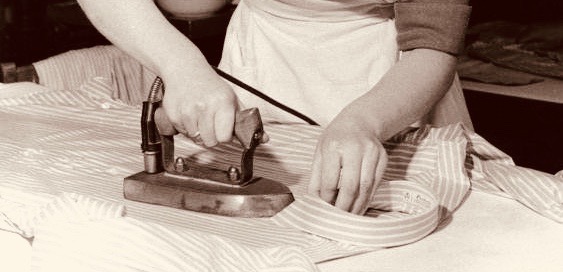
One day in 1944 my future existence hung by a tenuous thread. If a message secreted in a batch of laundry had not reached its intended recipient I would never have been born. On such tiny twists of fate and happenstance do our lives depend, though we rarely hear about them. But my mother often told this story in her dramatic continental style, and in my father’s papers I found his solemn account of the affair.
This is the story of a crucial moment in the wartime romance of my parents, Lydie and Frank. Frank was a soldier with the British troops who liberated the Belgian city of Ghent on 6th September 1944. Lydie was a native of Ghent, part of the joyous crowds who thronged the streets to greet the liberators with cheers and flowers. They met at a dance sponsored by the British army barracks. I’ve often wondered how my parents communicated. When Frank asked Lydie if she spoke English she replied “a leetle.” But it was enough to start a flirtation. When he first asked her to dance Lydie was reluctant because she thought he was Canadian. Frank’s unit of the Royal Signals Corps was attached to a Canadian army group for some reason and his uniform had a Canadian insignia. My mother explained later that the Canadians had a terrible reputation for heavy drinking and bad behavior in the city. But learning that Frank was actually British she readily danced with the “handsome boy” as she came to call him.
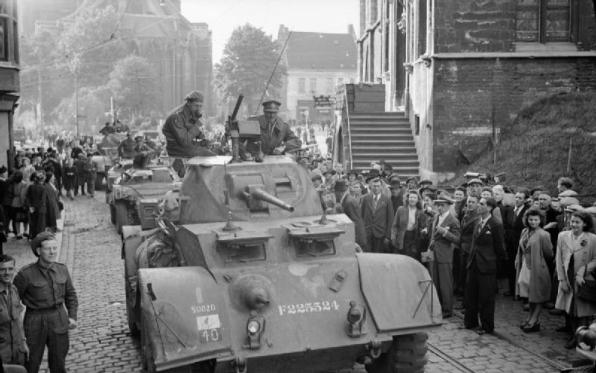
Soon Frank was a regular visitor to the house on Haardstedestraat where Lydie lived with her widowed mother. Lydie’s two younger brothers lived in the city orphanage where my grandmother had to send them because the privations of occupation and widowhood left her unable to support them. There was never enough food. They made soup from potato peelings and the occasional egg or pat of butter secured on the black market was a luxury. Lydie worked as a home help for a wealthy family, in part because they gave her a glass of milk every day. Now Frank brought them food and treats from the barracks such as they hadn’t seen in years.
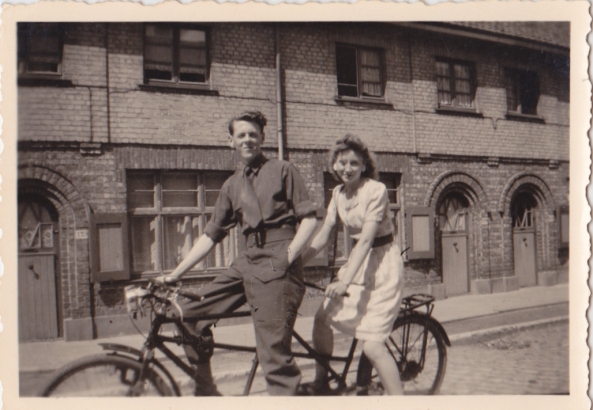
But busybody family tongues began to wag. The same family members who had done nothing to help my struggling grandmother during the occupation now presumed to interfere. According to them Lydie was ruining her reputation by walking out with a soldier. Once the soldiers moved on no respectable local boy would have anything to do with her. There was a grain of truth in this. Flemish girls who went out with German soldiers during the occupation were cruelly treated after liberation. My mother wrote in her memoir:
“One incident I shall never forget. It was a chilling, cruel spectacle. A jeering crowd stood around an open lorry. On the back of the lorry were chairs in which sat a group of women who had been rounded up and had their heads shaved. They were ashen faced and trembling. The sight made me feel sick and my mother and I quickly walked away. Further on we came to a house that was being vandalized and destroyed. All the furniture and contents of the house were being thrown out the windows and came crashing to the pavement below. The occupants of the house had fled. In our own street the same thing happened to a family whose daughter was engaged to a German army officer.”
Surely it would be different if the soldiers were liberators rather than enemy occupiers. But the interfering family members succeeded in frightening Lydie with accusations that her relationship was immoral. Her soldier, they said, would soon forget her when the British army pressed on into Germany. Then she would be shunned by the hometown boys. This is how Frank described his next visit to Haardstedestraat:
“This evening I went down for Lydie but when she opened the door she was in tears. I went in but it was some time before she could manage to say anything. This was it. Some evil devil has been spreading a vile tale that her relations with me were immoral.”
Talking it over Frank and Lydie agreed it would be best for her if they didn’t see each other again. On his return to the barracks Frank wrote his account of the ordeal and placed it in an envelope marked “Personal and Confidential.” It is clear from the tone that he intended to leave it as a declaration of Lydie’s good character.
Meanwhile back at Haardstedestraat Lydie’s mother arrived home to find her daughter sobbing and heartbroken. When she heard the cause she was irate. “Those sausenbrunder,” she said, using a Ghent dialect word for busybodies. “What right do they have to tell you what to do. Frank is a good boy. If my son were a soldier in a foreign land it would be comforting to know he was welcomed into a family home. Don’t you listen to those people. Tell Frank you’ll see him again.”
But there was one problem. Lydie had no idea how to get in touch with Frank. There were thousands of soldiers in Ghent, living in temporary barracks all over town. She didn’t know what to do. But her mother came up with a plan. She made her living by taking in ironing and since the liberation she did ironing for the British army. “Write a note to Frank,” she said, “and we’ll put it in the pocket of one of the army shirts. Perhaps whoever finds it will know how to get it to him.” On such a slim hope the future existence of my family hung.
The day after my grandmother’s latest batch of freshly ironed shirts were sent back to British forces Frank was out playing football (soccer) on a green near his barracks. A soldier ran up and called out to him waving a note. “I found it in my shirt pocket,” he explained, “I’ve no idea how it got there.” But Frank could guess. He read the note and without pausing to change out of his football shorts ran all the way to Haardstedestraat.
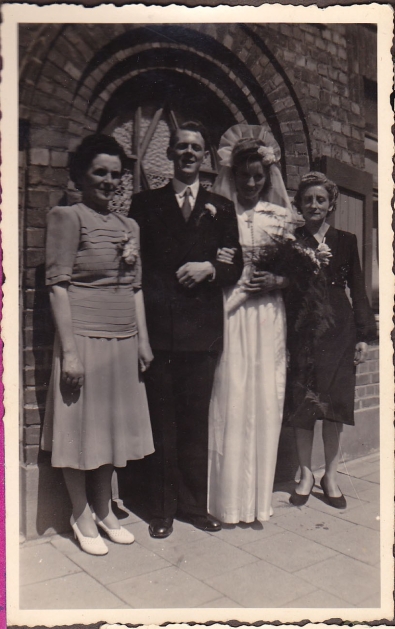
So Lydie and Frank’s relationship continued and when his unit was sent to Germany they exchanged love letters almost daily. In August 1947 they married in Ghent.
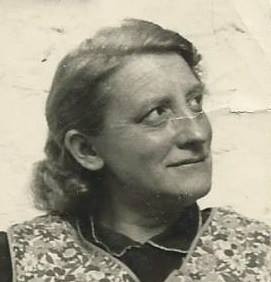
The heroine of this story is of course my Meme (grandmother) Camilla Bracke. A strong woman who endured much hardship, trusted her own judgement, and stood up to the sausenbrunder in the family.
My father loved her. The only time I saw him cry was when the telegram arrived from Belgium telling us she had died. He collapsed head in hands over the kitchen counter. I heard the strange sound of dry wracking sobs and then tears overflowed his eyes.
Here is a short video with scenes of the liberation of Ghent:

That is a fabulous story! So well done!!
LikeLike
Wonderful story, Rita. My husband was there in the Battle of the Bulge, wounded twice, bronze star earned. My DAd was in the first war. I am old enoughj to remember a great deal of that war and I loved reading your family story.
LikeLike
Great story! Actually I knew someone called Bracke who came from Ghent – may be related, or is it a very common name there?
LikeLike
What a fantastic story! I fell in love too!
LikeLike
Oops! I meant “America” not “American”. Just a slip of a finger.
LikeLike
Another heart-warming war story from you! I’m so glad I found you on WordPress because I love these stories of WWII during my earliest years. Thank you. Blessings wherever you are in American ~ Jo
LikeLike
Thanks for sharing. What a wonderful story!
LikeLike
That’s such a wonderful heartwarming story, Rita!
LikeLike
Oh my goodness what a sweet story!
LikeLike